Index relies entirely on the support of donors and readers to do its work.
Help us keep amplifying censored voices today.
[vc_row][vc_column][vc_column_text]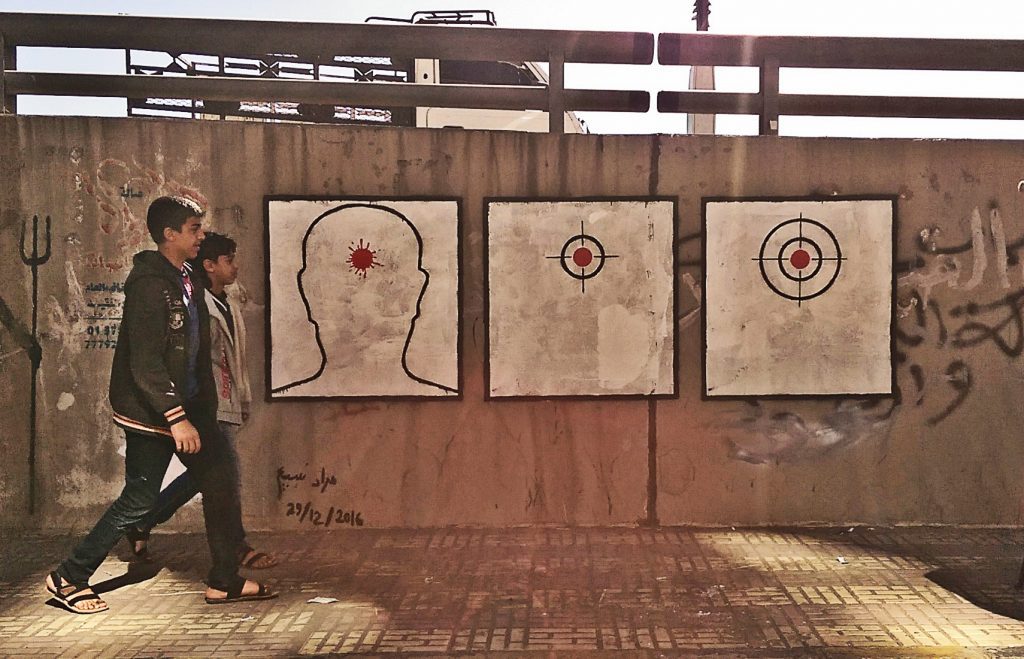
US president Donald Trump’s executive order banning citizens of seven predominantly Muslim countries from travelling to the USA for has had devastating consequences for thousands of people. Among them is Index on Censorship Award winner Murad Subay. The Yemeni street artist is now unable to visit his wife, who is currently studying in the USA.
“It’s really frustrating to even start thinking that I won’t be able to see her for that long,” he told Index. “She was supposed to visit during summer break, however, it seems that she can’t do that now.”
With uncertainty surrounding how the Trump administration’s policy towards Yemen will play out, the couple are now facing the very real prospect of not seeing each other until she finishes her studies four years from now.
“It’s been a really difficult time for both of us because it’s the first time we’ve been away from each other for more than a month,” Subay said. “I can’t say that this doesn’t have its negative effects on my work, for it surely does.”
At home, the worries that have plagued Subay throughout the Obama administration remain, particularly Trump’s continuation – and possible escalation – of his predecessor’s drone strikes in Yemen, which by February 2016 had killed up to 729 Yemenis including 100 civilians. One rural counter-terrorism raid authorised by Trump has already left at least 10 women and children dead, according to Al-Jazeera.
2016 Freedom of Expression Fellow Murad SubayMurad Subay is the 2016 Index on Censorship Freedom of Expression Arts Award-winner and fellow. His practice involves Yemenis in creating murals that protest the country’s civil war. Read more about Subay’s work. |
“Trump has no right to make things even worse for Yemenis. Yemen is already suffering from US arms deals with Saudi Arabia that helped fuel this war. Barring Yemenis from entering the USA under his administration only adds to these troubles.”
The war has been hitting close to home for Subay in recent months. Two of his cousins were recruited by warring parties and killed on the battlefield. – Fuad Subay, aged 26, was a soldier killed in Albuka’a, and Yaser Subay, just 14, was recruited by Houthis and killed in Isilan.
On top of this, a close friend of his, the respected investigative journalist Mohammed Alabsi, was killed in an apparent assassination. According to the Yemen Times, Alabsi had gone out for dinner in Sana’a with a cousin on 20 December. A little while later both men were rushed to hospital, where Alabsi died.
“I was told that blood came out of his ears and eyes,” Subay said. “Mohammed was investigating the black markets trading in oil that were associated with high-ranking politicians. I do not know the exact details of this, but what I do know is that Yemen has lost one of its most important and noblest investigative journalists, and that I lost a dear friend.”
An investigation into Alabsi’s death is underway.
Subay addressed a recent wave of violence against civilians, including journalists and public figures, in a mural entitled Assassination’s Eye, painted on the Mathbah Bridge in Sana’a in late December. Part of the Ruins Campaign, the minimalist painting depicts a sniper’s crosshairs training in on a human target.
“It conveys the assassin’s point of view, where it first feels like it is only a part of training on how to hit a target, but then in the final square the bullet ends up in the head of a real person rather than a target board,” Subay explained. “These assassinations have spread vastly since 2012, where they were mostly carried out among the military ranks and politicians. Lately, however, these operations have been targeting civilians too. I was planning to address this issue some time ago after hearing about the assassinations of innocent civilians in different places of the country, and that was just two weeks before I was shocked by the death of my friend.”
Elsewhere, Subay has been asked to serve as a judge for the Italian arts award, Fax for Peace, which invites students and artists from around the world to send pictures, videos or animations on the themes of peace, tolerance, human rights and the fight against all forms of racism. He said of the role: “It is a great pleasure to be selected as a judge in this contest and it is a big responsibility, which I hope to be able to carry out effectively.”
However, with Yemen’s economic circumstances ever worsening, and many working people now into their fourth month without receiving salaries, he sees difficult times ahead.
“It’s very harsh to see people every day looking for anything to eat from garbage, waiting along with children in rows to get water from the public containers in the streets, or the ever increasing number of beggars in the streets. They are exhausted, as if it’s not enough that they had to go through all of the ugliness brought upon them by the war.”
Referring to the deaths of his cousins and his close friend, he added: “No one can live in this country and not be affected by the war. This all happened in the last three or four months. These events make a month in Yemen feel like a year.”[/vc_column_text][vc_basic_grid post_type=”post” max_items=”4″ element_width=”6″ grid_id=”vc_gid:1486138786513-e5ca059b-efd0-1″ taxonomies=”8196″][/vc_column][/vc_row]
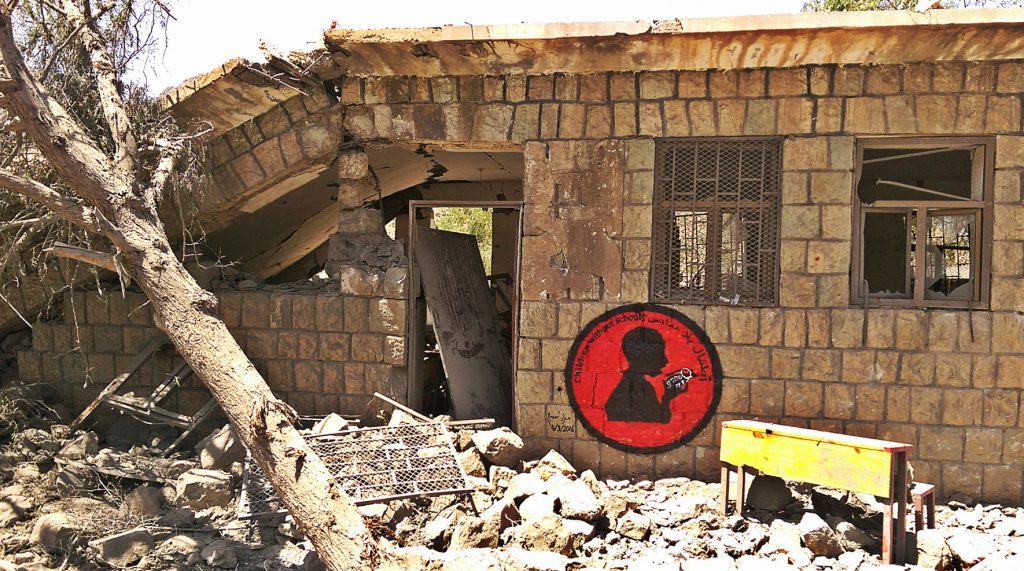
Credit: Ruins campaign. Bani Waleed, September 2016
On 3 September 2016, a group of Houthi rebels convened a meeting at al-Najah School in the al-Haima district of Bani Waleed, a local witness told Murad Subay, street artist and winner of the 2016 Index on Censorship award for arts, that the men entered the school without permission.
“We are not with any of the warring parties – we are caught in the middle,” the witness said.
Soon after, the school was destroyed in an airstrike carried out by the Saudi Arabian-led military coalition, killing one disabled student and adding 1,200 to the more than 3.4 million already forced out of education in the country as over 3,600 schools have been forced to close in the course of the war.
“Can you imagine? These are the soldiers of the wars to come,” Subay told Index. “Without education, these children could become tomorrow’s fighters and tools in the hands of extremists.”
At dawn on 4 September Subay travelled to Bani Waleed to create a mural on what remained of al-Najah.
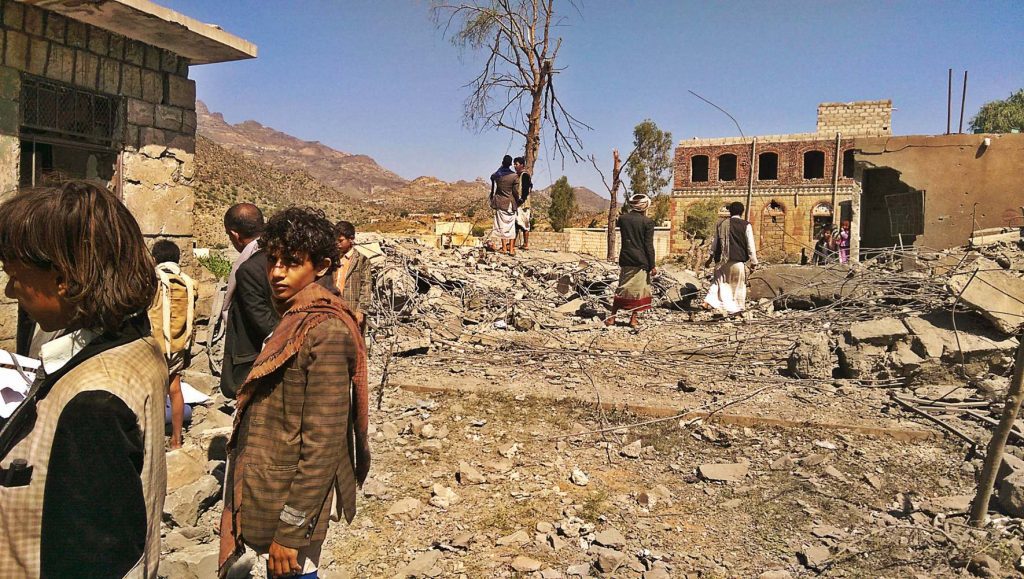
Credit: Ruins campaign. Bani Waleed, September 2016
“When we got there I asked some of the students what they were going to do now that their school was destroyed and some told me they will go to Sanaa while others said they will travel to surrounding villages,” Subay said. “But it will be much more difficult for the 400 girls who attended the school because traditions in Yemen mean they will not be able to travel alone, making it impossible for them to go to other villages to study.”
2016 Freedom of Expression Fellow Murad SubayMurad Subay is the 2016 Index on Censorship Freedom of Expression Arts Award-winner and fellow. His practice involves Yemenis in creating murals that protest the country’s civil war. Read more about Subay’s work. |
Destroying schools isn’t a big deal for the warring parties, the artist added. “Some of the children of those leaders who shout ‘death to America’ are studying at the best universities in the world, including in the USA, while each bombed school in Yemen – especially big ones like al-Haima – will take years to rebuild.”
The situation is made even more difficult in a time of war when resources and building materials are almost impossible to come by. “Even if the West stopped supplying weapons to Saudi Arabia today and patted themselves on the back saying ‘we are doing good’, Saudi Arabia already has enough to wage wars for another 150 years if it wants.”
If there is any hope for peace to prevail and schools, hospitals and other buildings belonging to the people are to be rebuilt, countries like Britain and America should take a step further and tell Saudi Arabia “to show restraint”, Subay said.
“While Saudi Arabia is doing the majority of the destruction, all sides of the war in Yemen must take responsibility.”
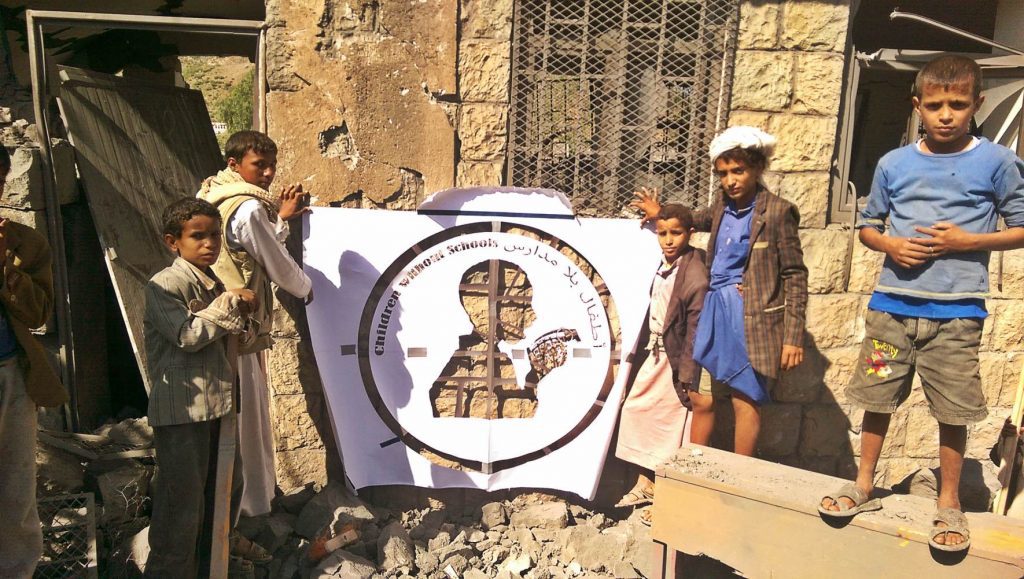
Credit: Ruins campaign. Bani Waleed, September 2016
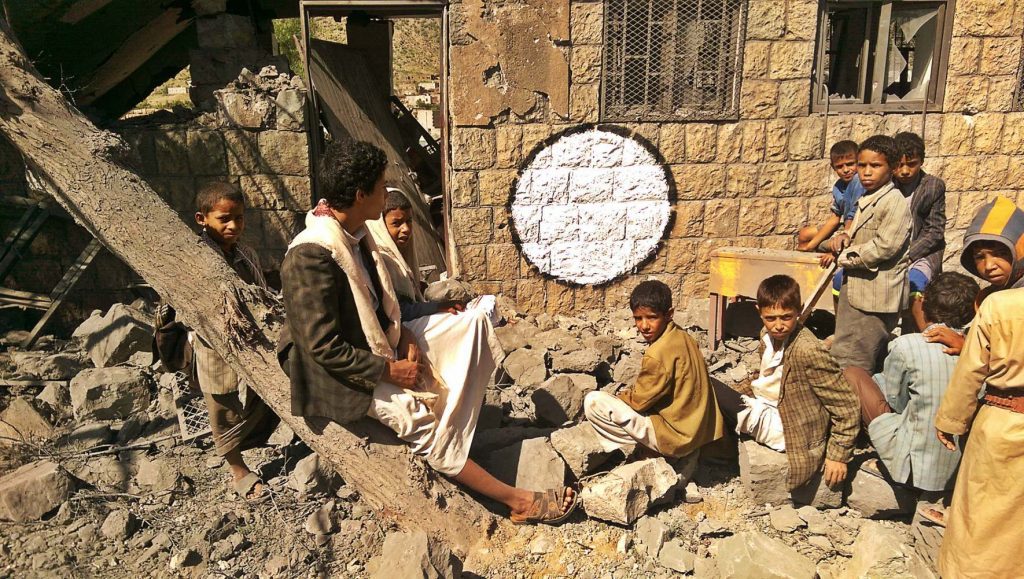
Credit: Ruins campaign. Bani Waleed, September 2016
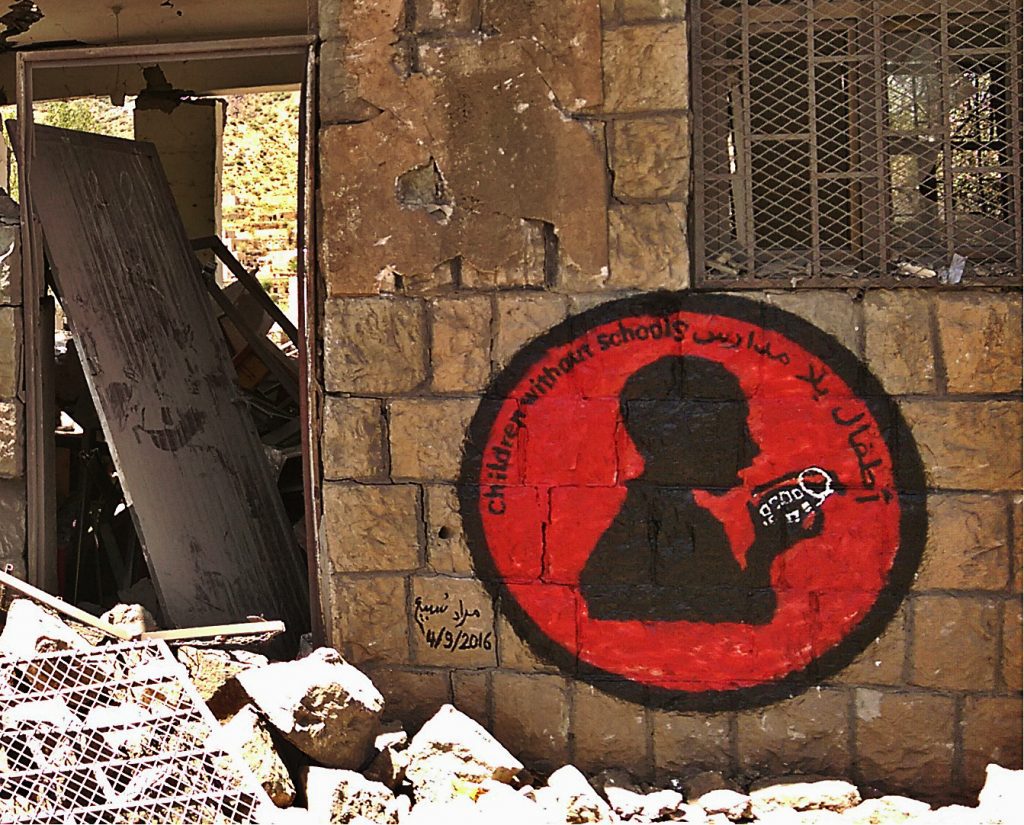
Credit: Ruins campaign. Bani Waleed, September 2016
The mural completed on 4 September depicts a child holding a hand grenade in place of a book, with the words “Children without schools” painted in English and Arabic.
When painting with fellow artists from the Ruins campaign – set up in May 2015 in collaboration with fellow artist Thi Yazen to paint on the walls of buildings damaged by the war – on 25 August, the group were arrested and interrogated by a local militia.
“They asked us to sign a letter with our fingerprints promising that we would not return again without permission,” Subay explains. “I actually did have permission from a local tribal leader but they wouldn’t listen.”
The artists were told if they returned they would be punished.
“My friends were very afraid and some of them said even with permission they would not return,” Subay said. “It was a strange situation for them.”
Subway himself isn’t put off and is already looking forward the next Ruins campaign, wherever that may be.
(2/2)whoever defaced the murals, wrote the word “steadfast” on both of them. #Yemen #Ruins_Campaign pic.twitter.com/3mhCfEulJT
— murad subay (@muradsubay) June 15, 2016
The last time he spoke with Index, Ruins had just completed a series of murals in front of the Central Bank of Yemen to represent the country’s economic collapse. Soon after the murals were finished, Houthi rebels defaced two out of the three works of art, writing “Samidoon” (صامدون), meaning “steadfast”, which is one of their slogans.
Assessing the situation in Yemen and the many different sides of the conflict, Subay said: “It is very difficult. Every night we hear airstrikes here and there, but we go on with our lives.”
“But any day when I can paint is a good one.”
Nominations are now open for 2017 Index on Censorship Freedom of Expression Awards and will remain open until 11 October. You can make yours here.
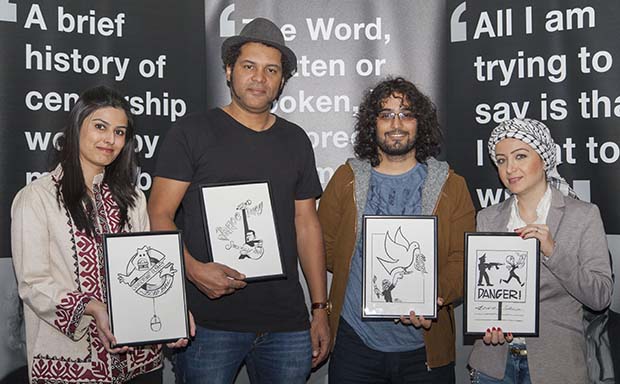
Winners of the 2016 Freedom of Expression Awards: from left, Farieha Aziz of Bolo Bhi (campaigning), Serge Bambara — aka “Smockey” (Music in Exile), Murad Subay (arts), Zaina Erhaim (journalism). GreatFire (digital activism), not pictured, is an anonymous collective. Photo: Sean Gallagher for Index on Censorship
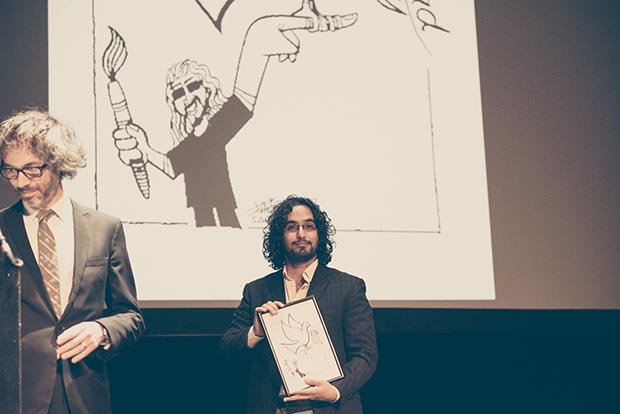
Pianist James Rhodes and 2016 Freedom of Expression Arts Award winner Murad Subay (Photo: Elina Kansikas for Index on Censorship)
Artist Murad Subay uses his country’s streets as a canvas to protest Yemen’s war, institutionalised corruption and forced “disappearings”. Since beginning a street art protest in 2011 Subay has launched five campaigns to promote peace and encourage discussion of sensitive political issues. All his painting is done in public during the day and he encourages fellow Yemenis to get involved. Subay has often been targeted by the authorities, painting over his works or restricting him from painting further.
I am honoured to be here with all of you today and for that, I would like to thank Index on Censorship for giving me this award, for believing in me and for acknowledging our work back home.
I want to thank my friends who join me every time I paint the walls of the streets and who share with me the same concerns over the issues that are really important. I also want to thank the good people of Yemen who have always supported us and who were the spirit of every campaign I launched to paint in the streets.
I would like to take this opportunity tonight to shed light on one of the biggest concerns for me and for many Yemenis. As many of you know, Yemen is going through one of the hardest times in its history, with the outbreak of internal and regional armed conflicts. Yemenis suffered greatly even before these conflicts broke out, and they’re going through this alone, but it seems that the heavy losses that Yemenis endure every day isn’t enough yet to capture the interest of the international community and media.
I dedicate this award today to the unknown people who struggle to survive, and I do not talk about those who are fighting the war with their weapons. Rather, I talk about every person who suffers a serious injury, who lost a family member or a loved one, who lost their home, school and job and who struggles to keep their family alive when they were starved to death. Those women, men and children are the real heroes that we should all bow to in respect for moving on and holding on to life.
Therefore, for the world’s presidents, kings and leaders who misused their power, it is true that you might never be tried, but you should know that you are leaving behind a dirty legacy in the time when you should concentrate on the real issues that face humanity, rather than throwing mindless wars and engaging the world in killing one another.
Again, I thank Index on Censorship and all its team for this award, and I thank you all for listening to me sharing my concern with you. Let’s hope for peace to prevail in Yemen as soon as it can be.
Thank you.
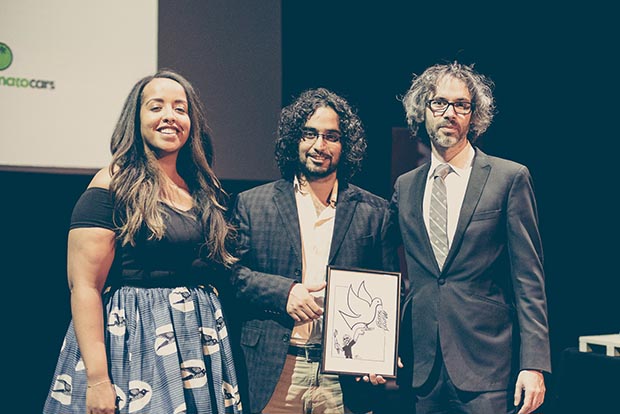
Theatre director Nadia Latif, 2016 Freedom of Expression Arts Award Murad Subay and pianist James Rhodes (Photo: Elina Kansikas for Index on Censorship)
#IndexAwards2016
Index announces winners of 2016 Freedom of Expression Awards
Jodie Ginsberg: “Free expression needs defenders”
2016 Freedom of Expression Awards: The other acceptance speeches
Bolo Bhi: “What’s important is the process, and that we keep at it”
Zaina Erhaim: “I want to give this award to the Syrians who are being terrorised”
GreatFire: “Technology has been used to censor online speech — and to circumvent this censorship”
Smockey: “The people in Europe don’t know what the governments in Africa do.”
In 2011, artist Murad Subay took to the streets of Yemen’s capital, Sana’a to protest the country’s dysfunctional economy and institutionalised corruption, and to bring attention to a population besieged by conflict. Choosing street art as his medium of protest, he’s since run five campaigns to promote peace and art, and to discuss sensitive political and social issues in society. Unlike many street artists, all his painting is done in public, during the day, often with passers-by getting involved themselves.
Since 2011, jihadist attacks and sectarian clashes have engulfed Yemen, and in 2015 a civil war began between two factions claiming to constitute the Yemeni government. The exiled Yemeni government, backed by a Saudi-led coalition stood against the Houthi militia, and those loyal to former president Ali Abdullah Saleh and backed by Iran.
In the last seven months the conflict has hit the already unstable country, leading to over 21 million people – 82 percent of the population – needing humanitarian assistance. In addition, a strong Al-Qaeda presence has drawn repeated drone strikes from the United States.
“Yemenis live under catastrophic conditions due to the conflicts, considering that they are already one of the poorest nations in the world,” Subay told Index. “They lack food, water and medicine, and they are in need of urgent humanitarian assistance.” With his art, Subay aims to highlight the situation in which millions of Yemenis find themselves in today.
Murad started his graffiti campaigns with The Walls Remember Their Faces, drawing the faces of Yemeni citizens who had been forcibly disappeared.
“This particular campaign meant so much to me,” he said. “I felt that I got closer to those people every time we painted their faces. Almost every week people came holding the picture of their long disappeared family member, so that we paint it on the walls.”
He then began Colour the Walls of Your Street, claiming back the bombed remains of Yemen’s capital, followed by 12 Hours in 2013. 12 Hours was an hour-by-hour series with each piece depicting one of 12 problems facing Yemen, including weapons proliferation, sectarianism, kidnapping and poverty. The project used social media to call Yemeni citizens to action, painting walls with messages about government and policy across Yemen’s capital.
His latest campaign Ruins was initiated in May 2015, in collaboration with artist Thi Yazen. The project involves them painting on the walls of buildings damaged by the war, to provide a memorial for the thousands of war victims, and to highlight war crimes.
Subay has faced pressure from the authorities, who have covered his work or stopped him from extending his campaigns to other towns. However ordinary Yemenis — including victims’ families — have gotten behind his campaigns by painting alongside Subay, or repainting pieces “scrubbed out” by authorities.
Murad Subay continues to shed light on the human cost of the war, taking his murals to other cities in Yemen, including Aden, Taizz, Ebb and Hodeidah.